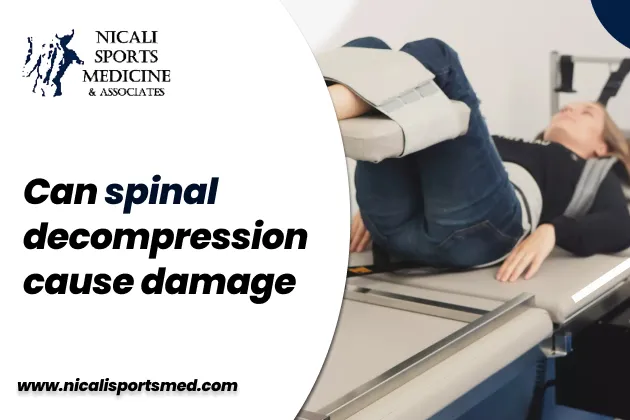Have you ever considered that a treatment for your back might reverse the benefits instead of helping you? Many others have experienced the same thing. Many people learn about spinal decompression as a solution for their back problems—and the first thing that comes to their mind is, can spinal decompression cause damage?
A very fair question…
When you experience back pain, you want to minimize its severity. That’s why we’re offering real, no-fuss, complete information. This guide is to provide help, regardless of whether you’re just exploring decompression treatment or already using it.
What Even Is Spinal Decompression?
Imagine it as a stretch for your back. While you’re receiving decompression treatment, the specialist gradually pulls to create room between your vertebrae. That space helps take pressure off nerves and discs. It also encourages healing by letting oxygen and nutrients flow better.
Most people lie down on a decompression table, strap in, and let the machine do its thing. It’s non-surgical, and many people say it feels relaxing.
Still, the question remains—can spinal decompression cause damage? Let’s look closer at that
Is Spinal Decompression Safe?
Generally, it is a safe treatment option as long as it is conducted by a skilled expert. Still, like the use of any medicine, there are some potential risks.
At times, some patients might notice some discomfort, reminded that they stretched a lot. But in rare cases, individuals experience severe pain after spinal decompression therapy due to an earlier issue that did not get diagnosed.
Some less serious spinal decompression therapy side effects include stiffness, dizziness, or discomfort. Often, they will disappear without treatment.`
The important part? Make sure the person doing your treatment knows their stuff. If you want to know if it’s a fit for your body, check out for more details on decompression therapy or come in for an assessment.
The Real Pros and Cons of Spinal Decompression
Let’s not sugarcoat it. Here are the real pros and cons of spinal decompression.
On the plus side, it can:
- Help with bulging or herniated discs
- Ease nerve pain
- Improve range of motion
When someone has spinal decompression for lower back pain, the benefits of decompressing the spine may take time before being noticeable.
Now for the downsides. You might feel some muscle soreness or tightness afterward. Rarely, decompression table side effects like headaches or increased pain can happen.
That’s why we always ask: how’s your body feeling after each session? If something’s off, we change course.
Can Spinal Decompression Cause Damage If Done Wrong?
Now, let’s answer that question more clearly—can spinal decompression cause damage?
Yes, if done improperly. If the machine is set with the wrong tension or if your spine isn’t stable enough, it can strain muscles or joints. There are even rare reports of worsened disc problems. That’s why having a trusted chiropractor makes all the difference.
You wouldn’t want someone guessing their way through a delicate treatment. Look for someone with experience, someone who’s walked patients through dozens of sessions without issues.
At Nicali Sports Medicine, we personalize every session to your spine’s condition, so you’re always in good hands.
Common Side Affects You Should Know
Though most people feel better after the first few sessions, others might feel odd pains or tension.
Here are a few things you might feel:
- Mild soreness (like after a deep yoga stretch)
- Muscle stiffness
- Rare cases of severe pain after spinal decompression therapy
- If you’re getting neck decompression, keep an eye on neck decompression side effects like dizziness or tightness
These side effects don’t happen to everyone. But knowing about them helps you stay alert and speak up if something feels off.
What About Lower Back Pain?
If you’ve been living with chronic aches, spinal decompression for lower back pain might be a lifesaver. It works by easing the tight pressure on nerves and helping herniated discs slide back into place.
For many, that means no more burning or stabbing pain down the legs.
Still, remember, can spinal decompression cause damage is not just a one-time question. It depends on your spine’s shape, your overall health, and how well your provider tailors the treatment for you.
Don’t guess—get a full spine check first. Book your decompression assessment here.
Who Should Avoid Spinal Decompression?
If you’ve had spinal surgery with metal implants, decompression might not be for you. Same goes for people with fractures, tumors, advanced arthritis, or pregnancy.
That doesn’t mean you’re out of options, but you’ll need a treatment plan made just for you.
And if you’ve tried it before and felt worse afterward, talk to your provider before giving it another shot.
Wrapping It All Up
So, can spinal decompression cause damage? It can—but only if done without care or without checking your spine’s condition first.
Many people find that it works well to ease their pain. You should begin gradually, select the best provider, and watch for any response in your body.
Before starting, always ask:
- Do I have any spine conditions that make this risky?
- Is my provider adjusting the treatment for me?
- Do I feel better or worse after each session?
Don’t rush it. Take your time. And if you’re ready to learn more, check out our full guide: Does Spinal Decompression Therapy Work?
FAQs
1. Can this really hurt my spine if something goes wrong?
Yeah, it could—but only in rare situations. If the tension is too much or it’s used on someone with the wrong condition, it can make pain worse. That’s why professional care matters so much.
2. Who should skip spinal decompression altogether?
Anyone with recent spine surgery, metal in their spine, bone fractures, or tumors should avoid it. Also not safe during pregnancy.
3. What’s the deal with side effects—should I expect them?
Most people feel mild soreness, like after a good workout. But some report severe pain after spinal decompression therapy, or neck decompression side effects like headaches. Rare, but it happens.
4. Is this better than surgery or medication?
For many individuals, the answer is yes. It does not require surgery, and patients can recover quickly. Still, it does not solve every problem. It contributes to the overall picture.
5. How do I know if this is working for me?
Listen to your body. Relief often comes gradually. If pain improves and mobility increases, it’s likely helping. If not, talk to your provider—we may need to adjust your plan.
Still wondering if it’s right for you? Click here to explore our decompression therapy services, or schedule your visit today!
Your spine deserves care—and you deserve relief.

